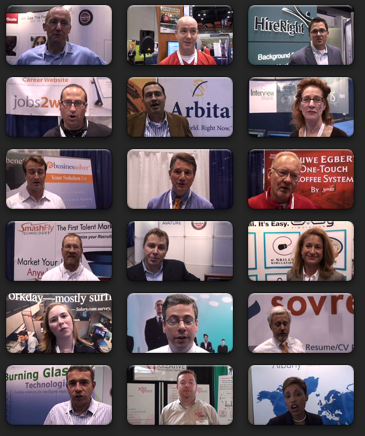Companies and the minds within them evolve over time. I have experienced it firsthand in founding Broadlook Technologies and steering its growth over the last 6 years. Core competencies change, competitive landscapes change, opportunities come and go and through all this there is your corporate identity and messaging. There is internal messaging, external messaging and…
THE ELEVATOR PITCH
While internal messaging may be something like “don’t complain about the 150 lbs slobbering behemoth of a dog the CEO brings in with him” (if they do, I bring in her soon to be 200 lb offspring), I am not focusing on that here. Today I am concerned (sometimes, up at night) about external messaging; that which is projected outwards to the marketplace. What brought this to my attention was my wandering around the booths at the recent Onrec conference in Chicago. Innately, I a very curious person; I want to understand. So I made the rounds to each vendor booth and simply asked them.
“So what do you do”?
For the most part, I was horrified with the experience.
Why? It was NOT because what I heard was awful. In fact, many pitches were excellent. I was horrified because it made me question and run to the Broadlook booth. Was my team excellent, or not so excellent?
Let me digress…Understand this is an area of pride for me, Dan Hughes (one of Broadlook’s co-founders) and I rock at the trade shows. People line up to get a peek at our latest solutions. We have well crafted pitches, regardless if we are talking to a recruiter, recruiting manager, sales rep or CEO.
How did my team at Broadlook Technologies do with their pitches?
Mixed results. Some were very good and some were poor. Next step, I called each of my reps that were not attending the show.
“This is Donato, I want you to call my cell phone back ASAP. I won’t pick up my cell phone. Leave me a message as if I was a prospect at a trade show and I asked you.”
“So what do you do?”
Armed with a larger sample size, it was hard for me to accept that Broadlook Technologies was, as it relates to elevator pitches…average. We filled out all sectors of the bell curve. That hurt. The blame was solely mine and I needed to do something about it. Average sucks.
Fast forward. Today Broadlook Technologies rocks the pitch.
How did Broadlook get there?
I did a deep dive into researching elevator pitch. Most of the research, materials and advice I found was related to making a pitch to get financing. In reality, this type of elevator pitch is 2-3 minutes long and is too lengthy for a trade show pitch. I needed techniques for a 20-30 second pitch, not 2-3 minutes.
Most of what I learned is that people have mastered copying each other. Like almost all writing in all industries, industry “experts” are copying 5 of the top 10 something’s from one place or another to build their top 10 list of something else.
I’ve never been good at that.
So it was time for fieldwork. Thus, for those that saw me in October conferences with my camera, I was learning. At the first conference, I was in not helping with the pitches; I recorded them as-is. The camera was cheap, and the audio quality was lack-luster. At the second conference, I had a new Sony HD camera. Video was great but the audio was poor with all the background noise. By the 3rd conference, I added directional microphone. By the 4th conference in October, I learned what made a great pitch and I was able to coach the people I was recording. After the 4th conference, I was confident enough to put together a 60-minute webinar: “The Art of the Elevator Pitch”. It went over very well for the vendors attending the Kennedy conference. In the webinar, I talked about elements of a good pitch as well as how to measure and coach a pitch. Info on measuring and coaching was absolutely void, so I feel I made a break-through contribution. What good is teaching something if you don’t have the tools to measure effectiveness and coach the topic?
This was a fun experience. In total I did about 60 recordings. 38 of the recordings made it into this blog entry. The ones I cut out were either very bad, or the video/audio quality was poor. I am not a videographer, some pitches were fantastic, but my camera skills were not and the end result was unusable. My end goal was to (1) share what I learned about pitches and (2) give the vendors that spent time with me a venue to get them some exposure.
If anyone that I excluded wants to be included, contact me and we can record your pitch via Skype and I will post it on a future blog. I’ll be adding an “elevator pitch” section to my blog, as I intend on continuing my research.
Much of the existing literature on the Internet about elevator pitches included 8-10 points to remember. Trying to remember 8-10 concepts at the same time can be paralyzing. I wanted to bring the whole process down a few, simple, memorable steps that anyone can implement. After my research and fieldwork I can up with a three-step process to build your elevator pitch. Enjoy the videos!
1. Talk about a problem. What is the problem in the market that caused you to create your product or service?
Sales reps spend 30% of their time prospecting. They use the Internet inefficiently. They are manually picking through web sites… cutting & pasting contact information. They do this because the leads they are getting are stale and overused.
2. How do you solve that problem? Be concise and clear.
Broadlook provides solutions that harness names, titles, emails, phone numbers and bio’s from the Internet. You choose the sectors or companies to target. The data is fresh. The data is actionable. Think about it: The most powerful list is the one no-one else has. We can help you build that list.
3. What makes you unique? Don’t use generic terms like the “best”, craft a something that truly differentiates you in the market.
We automate the entire process of Internet research from finding the data to moving it seamlessly into your CRM. We can change 8 hours of research into 15 minutes.
Lastly, for those interested in the powerpoint for the Art of the Elevator Pitch webinar. Get it here.
Elevator pitches – part 1
Elevator pitches – part 2
Elevator pitches – part 3

